Also referred to as user intent, search intent is the main reason why somebody whips out their phone and starts typing a specific set of words or queries into their choice of search engine.
Search intent is what the user wants to achieve with the search in the first place. This can be anything from looking for a particular website, exploring a topic, finding the answer to a specific question, or even looking to make an online purchase.
However, how to determine the intent behind a search query, and how to use that to the advantage of your digital marketing efforts? In this article, we aim to find out.
How To Determine Search Intent?
For example, someone in your target audience searches for the query “best mechanic’s toolkit” on Google. In this case, the search intent isn’t about navigating to a specific destination (website or page). They also don’t want to make a particular purchase just yet. This is only a research intent or doing the necessary legwork before finding the best offer.
In this specific case, the typed keyword has a commercial intent behind it. If we are determining search intent in SEO based on this information, we should optimize our content and content strategy for this keyword as well, among others.
Determining Search Intent in SEO: What’s The Big Deal?
The main aim of every search engine is to give the user relevant results based on their queries. Getting the idea of every search intent can do wonders for your search engine optimization efforts, with the possibility of ranking your site higher in the search results.
If you’ve been following the latest SEO trends closely, then you know that giants such as Google have put a lot of effort into better understanding the intent behind user searches.
What does this mean for your website? If your pages satisfy the search intent of your target audience and the keywords they are targeting, you may see improvements in the following:
- Content: Targeting the right keywords and understanding the intent behind the searches enables you to create a better content strategy and more relevant content in the future.
- Better rankings: It goes without saying that the relevance of your content is a crucial factor in SEO services, and if your content is valuable for your users, it will boost these efforts and rank you higher.
So, to get back to the toolkit example. Let’s say the key phrase has around 82,000 searchers every month, and you operate an online hardware store. It would make sense to rank these keywords with the product pages of your most popular toolkits, right?
Yes, but sadly, it doesn’t work this way. Google won’t consider “best mechanic’s toolkit” as a transactional keyword. Instead, the results will be more likely full of reviews about the top toolkit brands instead of eCommerce sites.
So, even if it seems relevant for a product page at first glance, it isn’t. Then, how can you outsmart Google? Determining search intent in SEO starts with understanding the different types of search intent.
Types of Search Intent
Experts usually differentiate four search intent types:
- Informational intent: The user seeks to learn more about a topic (for example, “What is ROI?”)
- Navigational intent: The user is looking for a specific place on the web (“Facebook login”)
- Commercial intent: The user wants to research the product before making a purchase (“best mechanic’s toolkit”)
- Transactional intent: The user is ready to purchase or take other actions (“buy Makita toolkit”)
Here’s a closer breakdown for each of these:
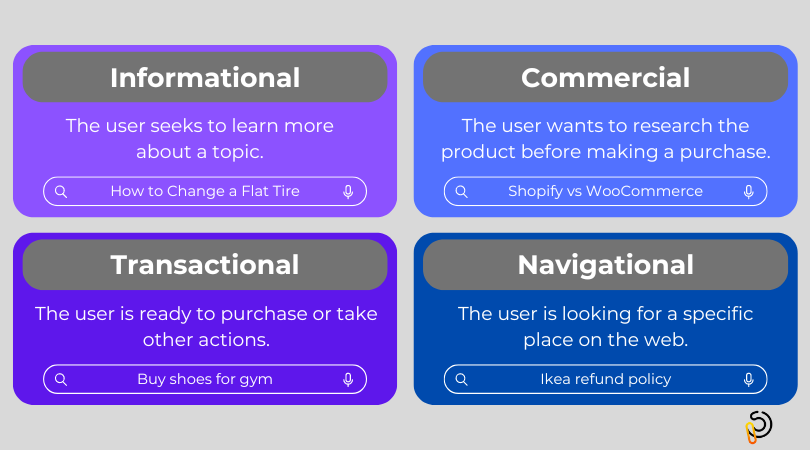
Informational Search Intent
This means that the user seeks to learn more about something. The search, in this case, is mainly phrased as a question with one of the classic 4Ws and the H (who, what, where, why, and how).
A good example would be “How to Change a Flat Tire” or “London Time Now,” and Google will often answer specific questions directly in the SERP (for example, the precise London time).
Still, the results for most of these informational questions will be mainly blog posts, meaning they should still be an essential part of your SEO strategy.
Targeting informational keywords can help you with visibility and lead generation, and useful, credible, expert information can help you build trust with your readers.
And even though informational queries rarely translate into direct conversions, they can be a valuable asset in your toolkit to grow your online presence.
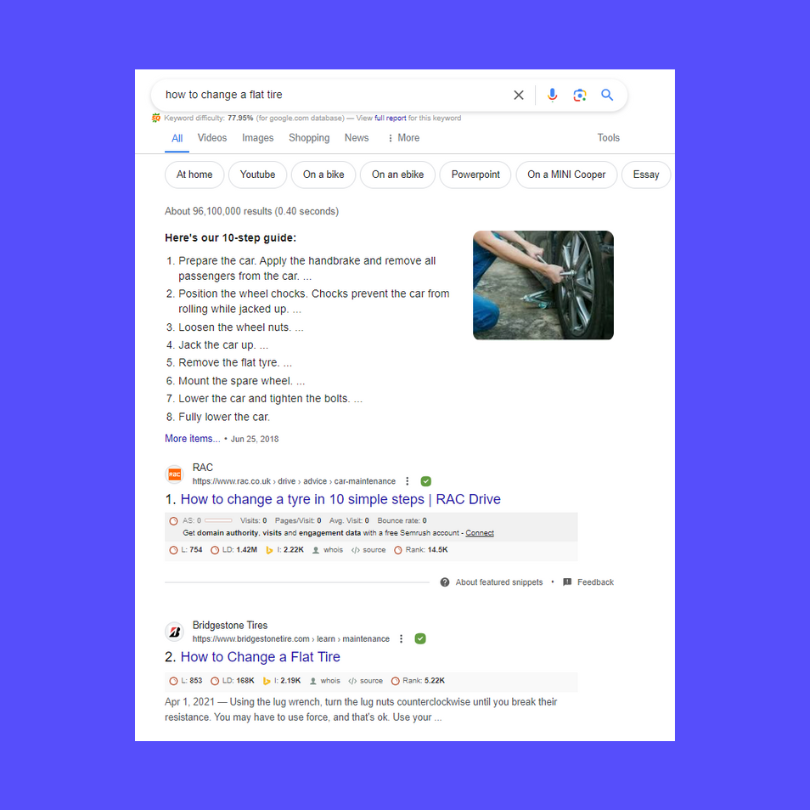
Navigational Search Intent
This means that users are looking for a specific site or page. In these cases, they know what they want to do and where to go.
Typing login queries or even complete URLs are great examples of this search intent type. They are often branded (“Ikea refund policy”, “Facebook login”), and they all serve to ensure that the user gets to the online destination as fast as they can.
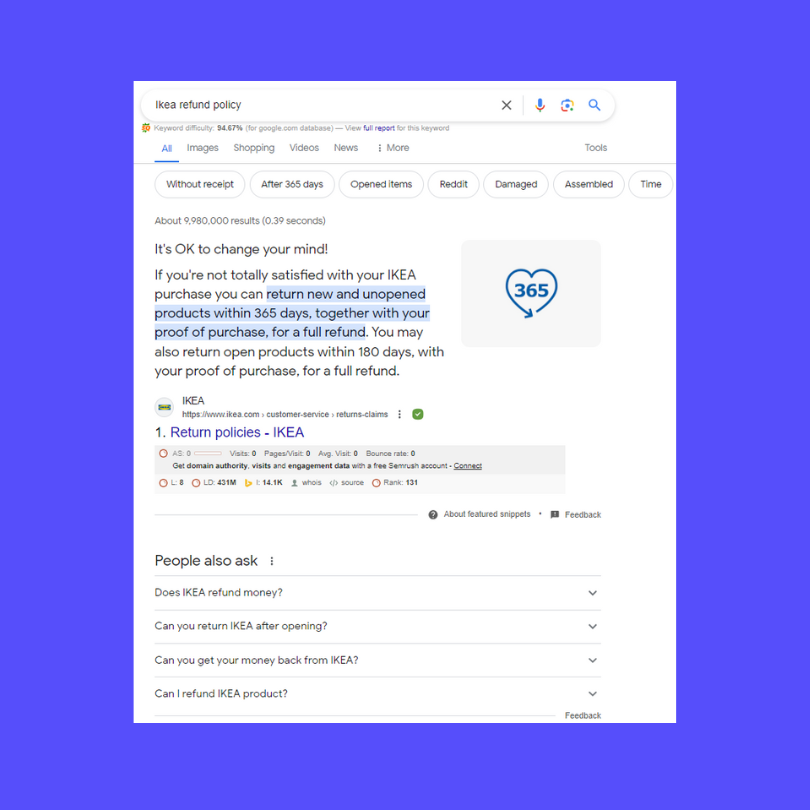
Commercial Search Intent
This intent includes the keywords people use when researching, typically before purchasing.
This is the “grey area” between information intent and transactional. The user seeks more information, but it’s already connected to a particular action.
Good examples for this would be “Netflix vs. HBO,” HP ZBook alternatives,” “Shopify vs WooCommerce,” and so on.
Search results will often display independent review sites, making it difficult for eCommerce sites to rank for these relevant keywords to make sales. Still, with the right marketing strategy, you can remain visible and play your part in the decision-making process, like with the inclusion of authentic reviews on your product pages.
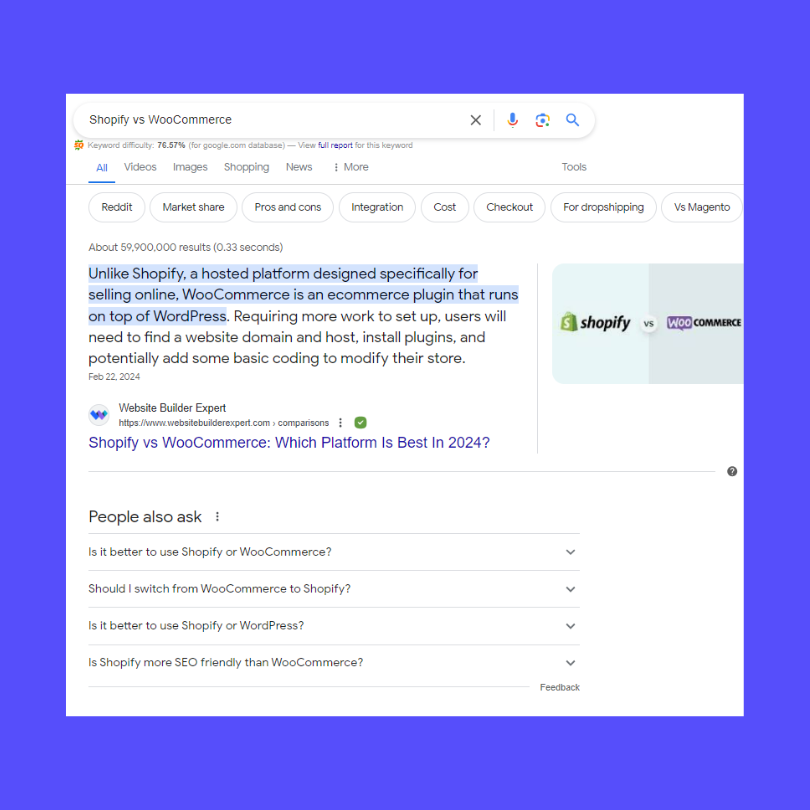
Transactional Search Intent
As mentioned above, these are the keywords people use when they are ready to take action, i.e., make a purchase. Even though the name implies selling, it isn’t restricted to making purchases. Users may also want to download something, sign up for a newsletter, or complete registration on a website.
Still, these are the money-makers that show that your leads are ready to convert and become customers.
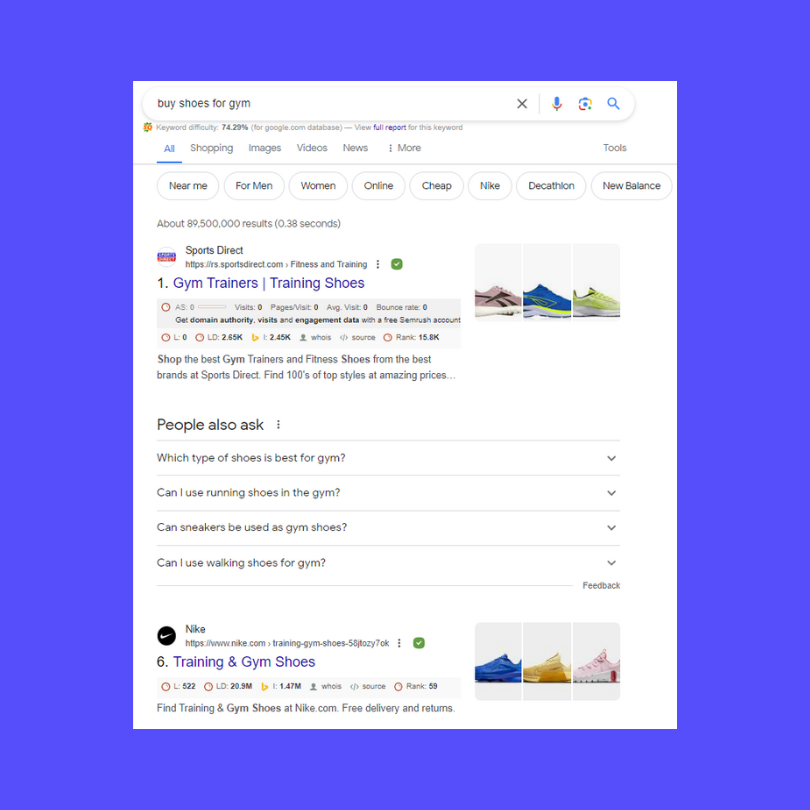
How to Determine Search Intent Behind Search Query
For the most part, search intent will align with where your users are in your marketing funnel.
- First, you have the awareness stage, where the user uses informational keywords to learn.
- Second is the consideration phase, where users are most likely typing commercial keywords.
- The conversion stage is when the person is using navigational or transactional keywords. User searches for transactional or navigational keywords like “Semrush plans.”
Determining search intent is pivotal for every SEO and content strategy. Fortunately, in most cases, you can easily assess search intent by just looking at the phrase, but in other cases, its purpose might not be that obvious.
Below are a few best practices that can help you with determining search intent.
Analyze Keywords
Take a closer look at the keywords your users are typing and look for similar phrases and content on your site. Analyze keyword patterns to better understand what they are looking for.
Review Search Engine Results Pages
Taking a closer look at the SERPs and how your target keywords perform in them is another good option. Look at the different types of content that rank high and figure out why they are relevant to specific queries.
Use Google Trends and Autocomplete
Trends enable you to examine search term popularity in different regions and over time. This can help you better understand any seasonal patterns in user behavior.
Autocomplete, on the other hand, will suggest popular searches in the search bar. This may also give you insights into what your target audience is searching for.
Use Google Analytics
Study user behavior. Look at the pages your users are visiting, how long they are on them, and what actions they take. This can help you determine what your users are looking for when visiting your site.
Evaluate Your Long-Tail Keywords
These usually indicate a clear search intent. By analyzing them related to your topic and content, you may better understand what your target audience is looking for.
Take a Look at Your Competition
By reviewing your competition’s content, you can gain insight into how they are addressing issues related to search intent. This can help you develop ideas for your content formats and topics.
Use NLP Tools
Natural language processing tools will analyze the language used in queries to pinpoint the intent behind them to better understand the preferences and needs of your target audience.
Stay on Top of Social Media
Monitoring social media discussions can help you pinpoint the comments, questions, and discussions related to your industry, services, or products. This can help you understand which are the common topics of interest and themes.
Experiment with Your Content
You can always try different content formats like podcasts, infographics, blog posts, and videos to see which are the most popular with your audience. The format that garners the most engagement may offer telltale signs of intent and the type of content users are looking for when searching related topics.
Be The Answer
Nailing search intent can be difficult but with the right approach and tools, you can get a better idea of what your users are thinking about when they start typing in the search bar.
Addressing every search intent type and keyword relevant to your site can definitely help you cater to different needs and buyer stages. Even though, that’s only the tip of the iceberg in modern SEO, it’s a good foundation that can help you implement more elaborate search engine optimization strategies.





